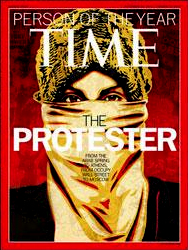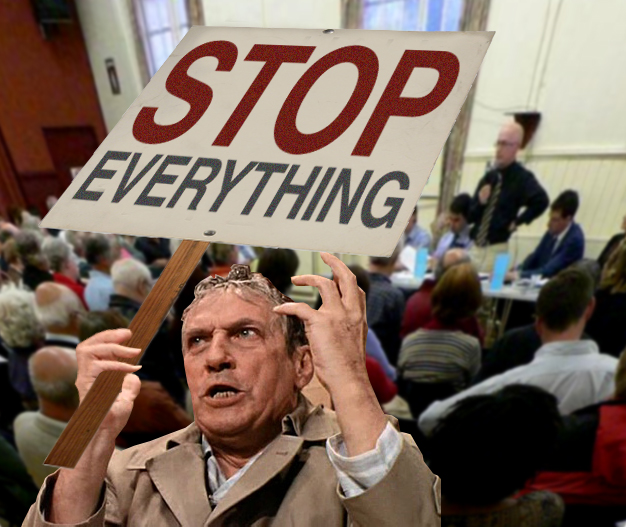A Placemaking Journal
Getting Beyond ‘Mad as Hell’: Here’s hoping for a civic afterlife
 On December 14, Time magazine announced its 2011 “Person of the Year.” And as it’s occasionally done in the past (Remember the choice of “You” in 2006?), the mag opted for a broad zeitgeist capture as opposed to settling on just one person. This time around it’s The Protester.
On December 14, Time magazine announced its 2011 “Person of the Year.” And as it’s occasionally done in the past (Remember the choice of “You” in 2006?), the mag opted for a broad zeitgeist capture as opposed to settling on just one person. This time around it’s The Protester.
“Is there a global tipping point for frustration? Everywhere, it seems, people said they’d had enough,” Rick Stengel wrote in Time’s intro to the 2011 “Person of the Year” section.
 There’s something about that phrase that sounds a tad familiar. Maybe a little Howard Beale-ish? You know: “I’m mad as hell, and I’m not going to take it any more!” from the 1976 Network movie that’s among the most quoted and mischaracterized films of all time.
There’s something about that phrase that sounds a tad familiar. Maybe a little Howard Beale-ish? You know: “I’m mad as hell, and I’m not going to take it any more!” from the 1976 Network movie that’s among the most quoted and mischaracterized films of all time.
In the role that won him a posthumous Oscar, Peter Finch was Beale, a news anchor at a fourth-place TV network who was slipping in the ratings and losing his grasp on reality after the death of his wife. When he learned he was going to be fired, the slide from mere depression into psychopathology accelerated, and screenwriter Paddy Chayefsky, who also won an Academy Award, had a field day trashing everything from phony Marxist revolutionaries to old fart/young babe affairs to Saudi Arabian-financed corporations. By the end of the movie, when Beale is assassinated on camera by the Marxist phonies desperate to protect their leverage in their own TV program negotiations, the landscape is littered with the remains of Chayefsky’s broadsides. Nothing and no one is left standing.
Yet our memories of the movie tend to re-imagine Chayefsky’s neutron bomb as a rifle shot targeting corporate greed in general and television in particular. We invoke Beale’s challenge to throw open our windows and shout, “We’re mad as hell, and we’re not going to take it any more!” as a kind of declaration of independence, as speaking truth to power. Out from under the thumbs of the oligarchs and into freedom’s wide open spaces. Finally.
Chayefky, who practiced a brand of satire so dark that it would be pure nihilism were it not for its hilarity, must have loved that. No characters in Network were treated with more contempt than Beale’s audience. They’re depicted as the fickle, easily manipulated consumers of the drek Chayefsky satirized, obedient multitudes provoked by a psychopath on TV to declare how mad they were at, well, TV and all the stuff that TV provoked in them.
To be fair, Time was conscious enough of the pitfalls to steer clear of undiluted (and un-ironic) protest romance. “Because,” as Kurt Anderson puts it in the main “Person of the Year” piece, deciding what you don’t want is a lot easier than deciding and implementing what you do want, and once everybody has a say, everybody has a say.”
Which is to say: When everybody is entitled to be a victim and to be mad as hell about it, and to interpret the sources of that anger and the potential remedies for the wrongs done them in their own way, it gets a little complicated.

Those of us who work in communities and regions anxious to overcome barriers that inhibit real community, that prevent physical and social connectivity, that limit access to decent housing and economic opportunity, recognize the romance of protest. Many of us have been trapped in community engagement exercises that get so stuck in the speaking-truth-to-power phase, that we don’t get to the part of a public process that empowers real change.
Determined to broaden participation, to harvest every idea and forge perfect consensus, we allow the means to become the ends. We count meeting attendees, website hits, newsletter mailings, tweets, blog comments and every other scrap of evidence of how well we’ve encouraged self-expression, including outrage and cynicism. But that’s not the ultimate deliverable of a public process. Taken by itself, engagement alone won’t produce results that might relieve some of the outrage and cynicism.
Nothing is more important than listening – and really hearing – the voices of concern and protest. But it’s not enough. The listening has to be purposeful and accountable. Somebody at some point has to turn the to-do list into action steps. There have to be measurable results. And that’s hard work.
Anderson, referencing the protests from the Mideast to the American Tea Party and the Occupy groups, allows for one of those jury-is-out conclusions about measurable results. Since “even free politics can be inherently unclean,” he writes, we don’t know yet whether the idealistic folks in the street “have the stomach for democratic hardball. Will the moral high ground keep working for them?”
A good question for all of us.
–Ben Brown
If PlaceShakers is our soapbox, our Facebook page is where we step down, grab a drink and enjoy a little conversation. Looking for a heads-up on the latest community-building news and perspective from around the web? Click through and “Like” us and we’ll keep you in the loop.


